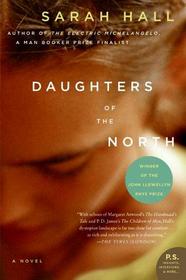** spoiler alert ** I vacillated between 3 and 4 stars for this book, because although I thought it was well-crafted and thought-provoking, after considering it, I didn't really like it.
I couldn't identify with the protagonist, and I didn't agree with her views. For a while, I thought that the author was intentionally creating a very problematic situation, but (I could be wrong) I think she actually agrees with her protagonist's perspective. (The interview with her at the end of the book turned me toward that point of view.)
However, regardless of the author's opinions, she's still created an interesting scenario.
It's a near-future England. After severe socio-economic collapse, the government is struggling to manage its population. The first major issue with the book occurs here. Although the government is shown as being restrictive, cracking down on personal freedoms, we see nothing to indicate that it is actually abusive. Rather, it seems to be going out of its way to maintain order, provide people with food, etc. Our protagonist is traumatized and resentful about being required to wear an IUD (this seems to be her main reason to rebel - but at the same time we see that people are living in crowded conditions and that there is barely enough food and resources to go around. I can't really disagree with the government's decision, although the program (as portrayed) could have been carried out with more sensitivity.
Our protagonist leaves her husband secretly and without warning. At first I assumed he was abusive or otherwise horrific. But no, it is later revealed that the two had been in love and then they grew apart because he was able to adjust and make do in his new life, and she refused to, insisting on hanging on to anger and resentment. She was angry at him for not maintaining the revolutionary political ideals that he held as a college student - basically, for growing up. Maybe this means I have become old and stodgy (I prefer to think of myself as adaptable), but I identified more with the husband than with her.
Then, hitchhiking, our protagonist has an encounter with a man in a van. Basically, he makes a pass at her. He doesn't threaten her with rape - but she acts like he does. The whole thing is a little weird.
Our protagonist reaches her goal, and after some tribulation, joins the female survivalist group she was intending on joining up with. The narrator makes a big deal out of insisting that the group is not a cult and that its leader, Jackie, is not crazy. However, it is more than clear that (at least by my definitions) it IS a cult, and Jackie IS crazy. The behaviors of the women in the group are horribly disturbing. Personally, anyone that beat me up, broke my bones and imprisoned me till I was on the verge of death would NEVER be getting called "Sister" by me. Under Jackie's crazed leadership, the cult gradually gets more militarily inclined, and things come to a head when Jackie decides to morph it into a true terrorist group. Some women are shown as seeing this for what it is, and they leave. Jackie then murders a couple of people who take off - something that is accepted as "necessary" by our protagonist. Jackie has absolutely no plan about how to improve the lot of England (except maybe that farming is good?), but decides to incite armed rebellion.
After that, I really thought that the author was trying to talk about how people can be led to accept horrible, unethical actions; led into violence... It is true that the women of Carhullan did make a better life for themselves (well, at least they had better food... they still had an awful lot of rules and hierarchy going on). But then in the author interview she was talking about "strong, capable women.. shaking off oppression.." and I'm like "What?! That's not the book I just read, Ms. Hall!"
It is still an interesting book though, because it leads the reader to consider the two different societies posited here - the repressive, crowded welfare state that still clings to traditional values that "Sister" runs from, and the repressive, hardworking, sex-segregated (it's mostly women, with a few men down the road) military-style camp that she runs to. Neither are shown as lovely options. But I think that Hall sees a lot more value in the latter than I do. I would prefer the first, with the option of working from the inside to demand more personal freedoms & rights from the 'Authority' - maybe not a goal that would be likely to succeed - but one with far more chance of succeeding than armed rebellion ending in mass bloodshed.




